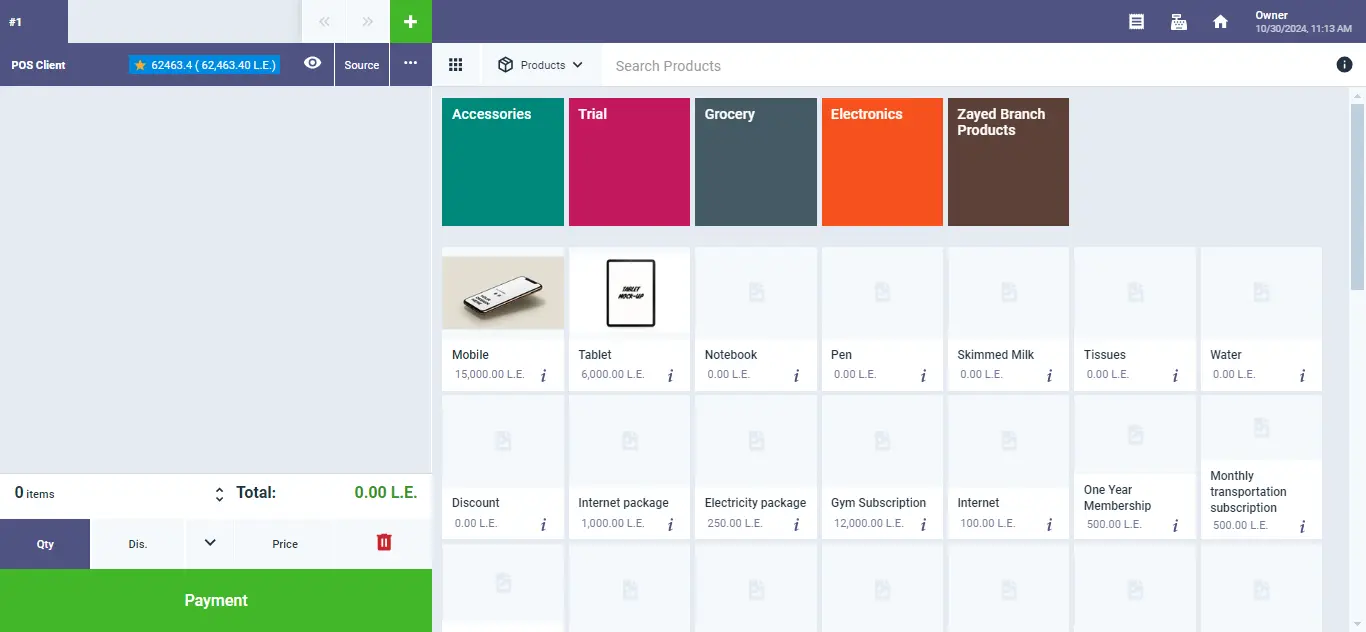Author : Haya Assem
Reviewed By : Enerpize Team
What Does POS Debit Mean? All You Need To Know

Point-of-sale (POS) systems have become indispensable business tools for streamlined transactions and better customer experience. Among the various methods of payment supported by POS systems, POS debit transactions are vitally important since they allow clients to make purchases directly from their bank accounts.
Understanding how POS debit transactions work is critical for both customers and merchants because it enables safe payments and effective financial management. In this article, we'll explain everything you need to effectively understand POS debit.
Key Takeaways
- POS debit transactions let customers pay directly from their bank accounts using debit cards at stores or online. The payment is processed instantly by verifying and deducting funds from the account.
- POS debit refers to the direct withdrawal of money via debit card, while a POS system manages broader sales and inventory tasks. On bank statements, these transactions show up as “POS Debit.”
- Customers use POS debit in different ways, like in-store purchases, online orders, subscriptions, and mobile payments. Each method offers fast and direct payment.
- To manage POS debit well, businesses need staff training, secure systems, and real-time monitoring. This helps avoid fraud and ensures smooth processing.
- Clear merchant names on statements and regularly updated systems reduce confusion and prevent disputes or technical problems during transactions.
- POS debit offers benefits like fast transactions, better accuracy, reduced cash handling, and improved customer satisfaction, making it ideal for modern businesses.
What Does POS Debit Mean?
A POS (Point of Sale) debit refers to a transaction that takes place when a customer’s purchase is made using a debit card at a physical location or online. When a POS debit transaction is processed, the amount is deducted from the cardholder’s account immediately or within a very short period, depending on the bank’s processing time.
This POS transaction usually involves three steps to process and complete a purchase securely:
- Purchase: A customer uses their debit card to make a purchase.
- Authorization: The POS system sends the transaction to the bank to verify sufficient funds.
- Successful Transaction: If approved, the transaction is completed, and funds are deducted from the customer’s account.
POS VS POS Debit
A POS system combines hardware and software to manage sales, track inventory, and accept various payment methods. Its main role is to streamline transactions by recording product details, pricing, and stock levels while generating receipts and maintaining accurate sales records. Transactions typically appear as "POS" or the business name on receipts and bank statements, indicating they were processed through a point-of-sale terminal.
On the other hand, POS Debit refers to a transaction done with a debit card through a POS system. When a POS debit transaction occurs, funds are withdrawn directly from the cardholder's bank account, instantly or shortly after. These transactions usually appear as "POS Debit" on bank statements, indicating a direct debit payment made through a point-of-sale terminal.
Read more: Explaining The POS Transaction on Bank Statement
POS Debit Examples
There are several types of POS debit transactions, reflecting how customers can use their debit cards to make purchases. These transactions can occur in different settings, including physical retail stores, where customers pay at the checkout counter, or online, where purchases are made through e-commerce websites. Here are examples that illustrate a POS Debit transaction:
1. Physical POS Transaction
Jack walks into a local electronics store to purchase a new smartphone. After checking various options, the one that suited his needs was priced at $550. At the checkout counter, Jack presented his debit card to the cashier. The cashier processes the transaction using a POS terminal, which is connected directly to Jack’s bank account. The total amount of $550 was deducted immediately from Jack’s account. This transaction increases the cash balance for the store and reflects an immediate revenue boost on the income statement.
2. Online Transaction
John decided to purchase a pair of shoes from an online retailer. After selecting the shoes, John proceeds to the checkout page, where the total amount is displayed as $100. John enters their debit card information to complete the purchase. The transaction is processed through an online payment gateway, and the $100 is deducted from John’s bank account almost instantly.
3. Recurring Transaction
Jessica has a monthly subscription to Netflix streaming service that costs $15.00. Each month, the service automatically charges her debit card for the subscription fee. The payment is processed through the POS system on the first of the month, which deducts $15.00 from Maria's bank account. This recurring transaction ensures uninterrupted access to her Netflix account.
4. Mobile Transaction
Nayla is out grabbing a cup of coffee. Instead of using cash or a physical debit card, she uses a mobile payment app linked to her debit account. She scans the QR code displayed at the café's register, and the app processes the payment of $5.00 directly from her bank account. This mobile transaction allows Nayla to pay quickly and conveniently, while the café receives the funds immediately.
Read Also: Best Restaurant POS Systems For 2025 And How To Choose One
Best Practice of Handling POS Debit
Effective implementation of POS debit transactions is critical for ensuring safe, efficient, and seamless payment experiences for both businesses and customers. To help you maintain secure and effective POS debit transactions, here are some vitally important best practices:
Train Your Staff and Keep Them Updated
Proper staff training ensures seamless POS operations and enhanced security. Ensure staff understand how to use the POS system, handle debit transactions, troubleshoot common issues, and adhere to data security regulations. Regularly update staff on any system changes or new security practices to keep them informed about potential fraud risks and the correct way to handle transactions.
Provide Customers with Highly Secured Payments
Protecting customer data is a top priority, and your POS system should support encrypted transactions and comply with PCI (Payment Card Industry) standards. Use security features like two-factor authentication to secure debit transactions. Offering secure payment methods, such as tap-to-pay or biometrics, assures customers that their sensitive information is safe.
Monitor Real-Time Transactions
Real-time monitoring of debit transactions helps detect and address any unusual activity quickly. Set alerts for high-value transactions or uncommon patterns that might indicate fraud. Real-time monitoring also helps to manage cash flow properly, optimize inventories, and reduce the chances of technical errors.
Educate Customers on POS Debit Safety
Provide your customers with clear information about how to use debit cards properly at POS terminals. Offer advice on protecting their PIN, checking for card skimmers, and regularly reviewing their bank statements for suspicious activity. By educating customers, you encourage them to participate in keeping transactions secure and help prevent unauthorized transactions.
Set Up Merchant Descriptors
Merchant descriptors are the identifiers that appear on a customer’s bank statement after a transaction, showing the merchant’s name and location. A clear descriptor helps customers recognize your business, reducing the chance of disputed charges and chargebacks.
Ensure Regular POS System Maintenance
Regularly update your POS software to the latest version to benefit from security patches and new features. Scheduled maintenance and software updates keep the system running smoothly, protect against vulnerabilities, and ensure compliance with the latest industry standards. A well-maintained POS system reduces downtime and technical issues, providing a seamless checkout experience.
How Enerpize Can Help in POS Debit
Enerpize offers secure POS debit features within its comprehensive ERP system, streamlining core business operations like payments, invoicing, inventory, and sales tracking. This all-in-one solution enables businesses to manage multiple payment methods, customize workflows, and automate reminders, creating a seamless experience for both staff and customers.
With real-time insights and optimized financial management, Our online POS software supports business growth through efficient resource and customer relationship management.
- Comprehensive POS System: Enerpize’s POS system supports multi-tab transactions, barcode scanning, and cash registry management to facilitate quick and accurate POS debit transactions and improve the overall checkout experience.
- Secure Transactions and Customer Safety: Automated reminders, secure installment tracking, and an easy refund process help ensure that POS debit transactions are handled safely while keeping customers informed and engaged.
- Insights and Reporting: Enerpize provides detailed sales reports and transaction summaries, allowing businesses to monitor POS debit activities, manage cash flow, and improve financial accuracy.
- Customizable Discounts and Offers: With Enerpize, businesses can create and apply discounts directly at the POS, making it easy to run promotions and offer incentives that boost customer satisfaction.

FAQs About POS Debit
What Does POS Debit Mean On A Bank Statement?
On a bank statement, POS Debit indicates a transaction that has been completed at a Point of Sale (POS) terminal using a debit card. When a customer purchases with their debit card, the purchase amount is deducted instantly from their bank account, ensuring immediate payment to the merchant. This process allows customers to manage their finances more effectively, as they can see real-time changes to their account balance.
Unlike credit card transactions, which draw funds from a credit line and may take time to reflect in the account, a debit card transaction involves directly transferring funds from the customer's account to the merchant's.
Can a POS Debit be Reversed?
Yes, a POS debit transaction can be reversed, but the process depends on several factors. If you've made an unauthorized or incorrect purchase, you should contact your bank or debit card issuer as soon as possible to request a reversal. Each bank has specific policies and time limits, typically around 30 days—within which you can initiate this process.
In some cases, if a direct reversal isn't possible, you might be able to initiate a chargeback, especially in instances of fraud or failure to deliver goods or services. Additionally, if the transaction was for a purchase, checking with the merchant directly regarding their return or refund policy could also help facilitate a reversal. Be prepared to provide relevant documentation, such as receipts or transaction details, to support your request.
POS debit transactions are easy with Enerpize.
Try our POS module to manage your POS debit transaction.








